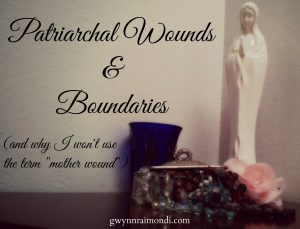 Boundaries and our ancestors and patriarchal wounds. These things are so intertwined.
Boundaries and our ancestors and patriarchal wounds. These things are so intertwined.
At some point in our human history, we, especially us women, lost sight of our boundaries. We lost sight of the separation between us and others. We lost sight of our needs and wants. We lost sight of us.
I believe there was a time in our history when we were deeply connected to our Self. A time when we lived in an egalitarian culture. Then something happened or likely many things happened and over time patriarchy arose and with it came all the wounding: shame, misogyny, no longer defending our boundaries, or speaking up or out, or breaking any rules, for fear of torture or death. (Anthropology seems to back me up in this.)
We, women, did what we needed to survive. We still do. We play the game, we follow the rules as best we can, until we just can’t any longer. Some of us never reach that breaking point. Many of us do.
Our mothers did the same. And our grandmothers. And our great-grandmothers. And so on back through our womanline for a few thousand years.
These women who came before us, they wanted us to survive too. They loved us, their daughters. They were terrified for us being in the world they brought us into.
So they trained us. They taught us to obey. To be deceitful so we can get our own needs met, and in this deceit we learned to not trust our sisters (or mothers or grandmothers). To play by the rules while still finding ways to hold onto our Self or to let go of our Self completely. They taught us how to survive in a culture that didn’t consider us fully human, that considered us property, that saw nothing wrong with raping, beating or murdering us.
The ways they taught us to survive equated to playing small, to being silent, to being obedient and docile and doing as we were told. It equated to not speaking up or out. It equated to serving others, particularly men, with little to no regard to our own exhaustion or needs.
This training, this wounding, is often called the mother wound. I’ve used that term, as recently as a couple months ago, and although I’ve used it, it has always bothered me.
It bothers me because it places the blame of our wounding, seemingly, on the surface, on our mothers. On all mothers.
Because we as mothers don’t already carry enough of the responsibility of the ills of the world. Hello Eve and Pandora, just to name two.
The truth is, this wounding isn’t from our mothers. Our mothers, all our ancestral mothers, wanted us to survive. They loved us so deeply and wholly. And they were terrified for us.
How do I know?
Because I am terrified for my own daughter and the world I am sending her off into. And this world I’m sending her into is much tamer and gentler than the world our ancestors, including our own mothers, sent their daughters, including us, off into.
So I have an issue with the term mother wound. Because these wounds we carry, aren’t really about our mothers. They are about trying to survive in a culture that hates women.
All women. Yes, some women more than others, absolutely. Yes, the color of our skin and our socio-economic status and how high our education goes all play a part. And whether we’re married or mothers or how many fathers we have for our children and what color skin our partners have and and and…. Intersectionality is vital in the work of unraveling all of this.
And.
All women are hated in our culture. Matters of degree make little difference when we look at the statistics on rape or interpersonal violence or murder by boyfriends or husbands. Those numbers cross all skin colors and classes and education levels.
This is not to say that we don’t carry wounds from our actual lived experiences with our mothers. Of course we do. We feel betrayed by them for trying to break us so we could live. Our pain and wounds of our lived experiences with our mothers are valid. And need to be processed and healed.
And.
While we need to heal our own micro-lived-experience-wounding, we need to remember the macro of the issue at hand.
It is our misogynist, patriarchal culture that is at fault.
Yes, our mothers are responsible for their actions. Yes, many of them did not do their own inner work so that they would not pass on this wounding and instead taught us healthy ways to survive and still feel comfortable in our own skin. Yes, they screwed up. Yes, they are human.
And by placing the blame fully on our mothers and our womanline, by putting them at the center of our wounding, we are continuing to be complicit and compliant to the misogynist patriarchal culture that created the environment for this wounding to even occur.
So I’ve decided to stop using the term mother-wound. Because it’s not entirely accurate. It’s misdirecting. It only feeds our internalized misogyny instead of helping us dislodging it from our bodies and being.
This is actually part of my own boundary work. Making the distinctions between what is mine and what is someone else’s and what is culture. Unraveling the stories and training that my ancestors have passed down through word or action or DNA (or all three). Learning to listen to my own body and knowing and getting to the root of something when it doesn’t feel right or feels off or doesn’t sit well with me.
This is part of connecting to our intuition yes, and it is also part of connecting to our boundaries. Of acknowledging when something, particularly a commonly used or “known” something, doesn’t feel right to us. Of saying no when that not right feeling comes up. Of doing different so not to pass on something that doesn’t feel right to us in the first place and only causes more wounding and damage.
Boundaries are more than telling someone you aren’t going to let them take advantage of you again. Boundaries are about more than our relationships with other people (though, in truth, a lot of how our boundary work plays out is in our relationships with others).
Boundaries are also about saying No More to a culture that hates us.
Boundaries are about saying No More to passing on the training and wounding of our culture.
Boundaries are about knowing our Self, so wholly and deeply that we don’t question when something doesn’t sit right if that off feeling is valid or not and instead we dig into the why so we can understand ourselves better and then do different in the world.
Boundaries, I believe, are at the base of our ancestral healing of our patriarchal wounds. As we learn more and more about our own boundaries, we heal the pain of our ancestors who weren’t allowed to have their own boundaries due to risk of torture or death.
As we lay claim to our bodies, to our minds, to our spirits, we are defining the distinctions between our own Self and the Self of others. We can know intuitively and immediately when someone is projecting their “stuff”on us as opposed to some critique of our behavior having merit.
Boundaries are how we connect to our Whole Self. Because without boundaries, we cannot define who we actually are.
As we do our own boundary work we learn that boundaries are not rigid nor are they static. They are flexible and have an ebb and flow depending on the people, places, time and events that are invoking them. We may have a more rigid boundary with one person than with another. We may need more physical space from some people than others. And even these boundaries may shift depending on what all is happening in our lives, sometimes needing firmer boundaries with those we generally are pretty easy and loose with.
Even with this being true, that boundaries are more of a fluid thing than not, we must be able to sense these boundaries in the first place.
And, you can probably guess, I deeply believe we learn to sense our boundaries by deeply connecting to and embracing our bodies. By inhabiting them. Feeling them. Knowing on a visceral and deep level what exactly embodiment means.
So we can feel our boundaries and know immediately when they have been breached. And honor and defend them, as we deserve to be honored and defended.
It is deep work and messy work and there is much unraveling and untangling and dismantling that must happen.
And it is so deeply and truly and wholly freeing.
Our boundary work is all a part of becoming our own version of the Unleashed Woman. It is another layer in taking off the leash that was put on us at birth by our culture. It is another layer of coming home to our Self.
And isn’t it time to do that? To come home to our Self? To take off this patriarchal leash? To become our own Unleashed Woman?
xoxo
Did you enjoy reading this? If so, I invite you to subscribe to my weekly love letter which includes all kinds of goodies right over here.
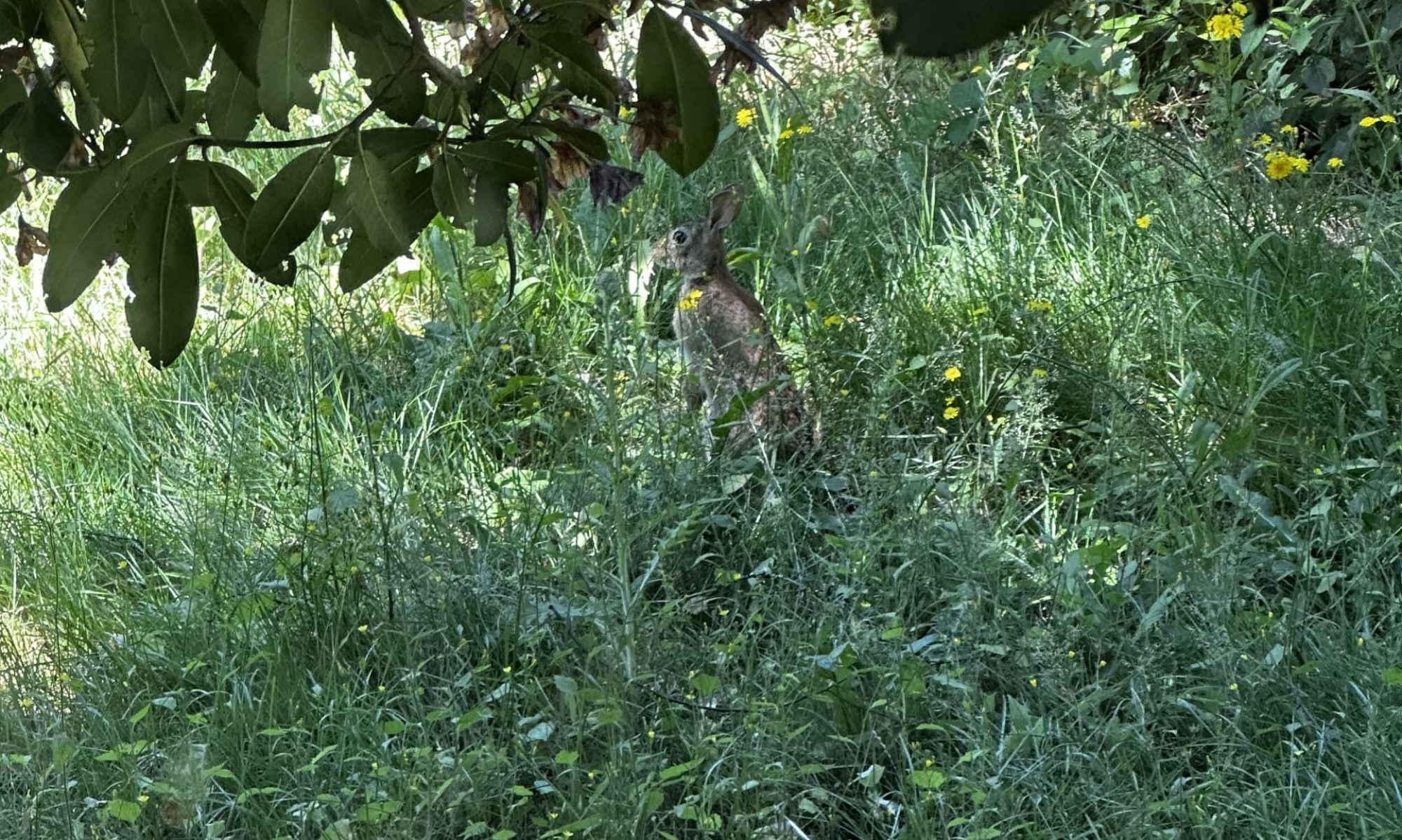
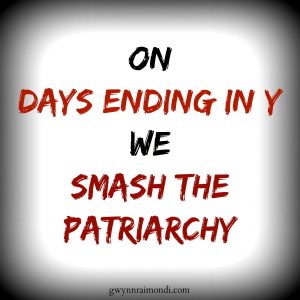 Now, let’s go smash this shit to bits.
Now, let’s go smash this shit to bits.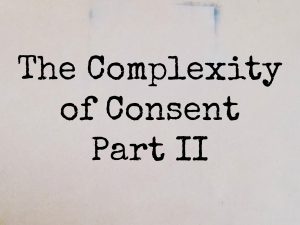 Last week I wrote about how sometimes consent is a tricky thing
Last week I wrote about how sometimes consent is a tricky thing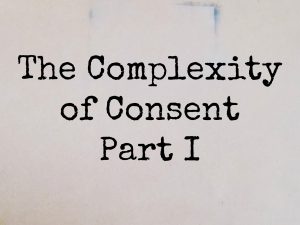 Five years ago, while still in graduate school, I had a day surgery give me a bigger understanding of trauma and the impacts it has on our body. That semester I fought to be in the Crisis & Trauma class, it was the last time it would be offered by one of my favorite professors and there was a screaming within me that I needed that particular class at that particular time in my life. I had to fight with my academic advisor and demand over and over to be let into the class. I didn’t understand the warrior within me who was battling so hard for this class, there was no logic at that time which said to take it now and that I couldn’t take it later. And yet I knew, my body knew, that taking the class later was not what I needed. I needed to take it now. I eventually convinced my advisor and he got me into the class.
Five years ago, while still in graduate school, I had a day surgery give me a bigger understanding of trauma and the impacts it has on our body. That semester I fought to be in the Crisis & Trauma class, it was the last time it would be offered by one of my favorite professors and there was a screaming within me that I needed that particular class at that particular time in my life. I had to fight with my academic advisor and demand over and over to be let into the class. I didn’t understand the warrior within me who was battling so hard for this class, there was no logic at that time which said to take it now and that I couldn’t take it later. And yet I knew, my body knew, that taking the class later was not what I needed. I needed to take it now. I eventually convinced my advisor and he got me into the class.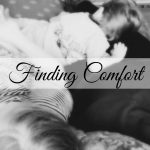 In my bed with with flannel sheets and big heavy and fluffy blankets and many pillows.
In my bed with with flannel sheets and big heavy and fluffy blankets and many pillows.